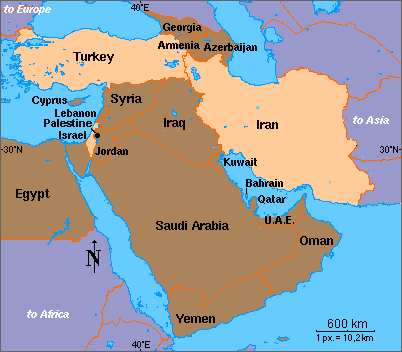
Now more than ever the Israeli-Palestinian issue is of extreme importance. Recently Israeli Prime Minister Ehud Olmert resigned and will leave office this November. With his replacement, Tzipi Livn, may come another set of policies towards Palestinians and another hitch in the US backed peace talks. According to the BBC, Livn has vowed to continue the peace talks with the Palestinians and she expressed Israel's desire for peace with all of their Arab neighbors. Livn also recognized the emense troubles that Israel faces with their attempts for peace as terrorist groups and extremist groups continue to use violence.
In order to fully understand the conflict today we must look at the history of this conflict. Historically the Palestinian region has been an area of enlightenment and culture along with violence and tension among the three main monotheistic religions. Islam, Christianity and Judaism all have important religious history in the region. Although the conflict goes back centuries, I want to focus on more modern history, from mid 1900s on.
Here is a time line of the main events of the Israeli-Palestinian Conflict:
1917: Great Britain gains control of the region from the collapsed Ottoman Empire.
1923: The land was divided along the Jordan River into two parts. Jews were only allowed to migrate to the area west of the river as the area east was reserved for Muslim-Palestinians. The Muslims were not happy with losing their land and began to attack Jewish-Palestinians.
1947: Jewish-Palestinians began organizing and the British turned the area over to UN control. the UN introduced resolution 181 which separated Palestine into Jewish areas and Muslim areas. The Jews accepted the resolution, but the Muslims still believed their land was being stolen from them.
1948: The Jews declared their own state, Israel and on the very next day six of their Arab neighbors declared war on the new nation. 19 months later Israel emerged victorious and gained some territory.
1967: The Six-Day War begins with Israel fighting Egypt, Syria, and Jordan. Israel defeated all three countries and gained large amounts of territory; The Sinai Desert from Egypt, the Golan Heights from Syria and the West Bank (including East Jerusalem and its Old City) from Jordan. Instead of returning the predominantly muslim areas, Israel occupied the region which caused much upheaval and creation of more Islamic resistance groups. Also occupation caused a severe refugee problem.
1982: Israel, in an attempt to improve legitimacy, returns most of the occupied lands except the Golan Heights of Syria.
Here is a nice video about the history of peace negotiations between the two:
http://www.bbc.co.uk/mediaselector/check/player/nol/newsid_7110000/newsid_7113900?redirect=7113998.stm&news=1&nbwm=1&bbram=1&bbwm=1&nbram=1&asb=1

2 comments:
This is a very interesting post. I knew that Israel and the Muslims had violent issues but I did not know about Christianity playing a role in the religious wars during the 1900's. I enjoyed reading the history, but I did have a question about the Munich incident in Germany and how and when that occurred. Why did that incident happen? I know it happened in 1972.
thanks
Kia,
Your post on Israel is very intriguing, since much of Israel's history seems to be shaped by conflict. The peace negotiations are a grand step, and Israel and Palestine should do everything they can to further the peace process. This peace process appears to have begun in 1982, when Israel returned most occupied territories to their respective owners, except for Syria. Why did Israel choose to retain the Golan Heights, instead of returning the land? Also, Israel's history seems to involve only Islam and Judaism. How did Christianity become entwined into Israel's history?
Tommy
Post a Comment